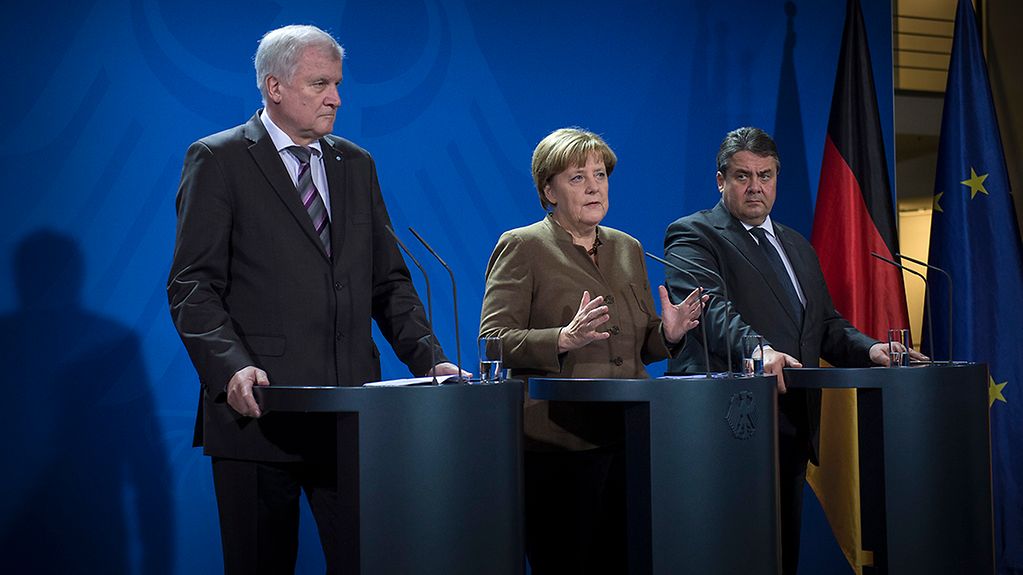Another asylum package
A standardised identity document, reception facilities across Germany and stricter residence obligations for asylum-seekers – these are the objectives identified by Chancellor Angela Merkel and the leaders of the governing coalition. After the meeting Angela Merkel met with the state premiers to discuss refugee policy.
4 min reading time

Leaders of the governing coalition have agreed on further procedure to address the refugee crisis
Photo: Bundesregierung/Bergmann
In future there is to be a standardised identity document for asylum-seekers and refugees, and a database that will make it possible to compile all data needed for asylum proceedings. The standardised document will replace the number of separate registrations and recordings that people arriving in Germany currently go through.
The registration and issuing of an identity document will be a precondition for submitting an application for asylum and receiving the concomitant benefits in Germany. This will then "bring together the different registration points that currently exist at national, state and local authority levels," explained Angela Merkel.
Accelerated procedure in reception centres
To accelerate asylum proceedings for applicants with few chances of having their application approved, special reception centres will be put in place that will be responsible for submitting, processing and deciding on applications for asylum, and for appeal procedures and return. All in all there are to be five centres of this sort, initially in the Bavarian towns of Bamberg and Manching.
More streamlined procedures should speed things up so that the administrative procedures can be completed within a week. Should individuals wish to appeal against the rejection of their application for asylum, these legal proceedings too are to be finalised within two weeks.
Asylum-seekers from safe countries, those who have already been banned from re-entering the country and those who are not willing to cooperate are among those deemed to have few prospects of seeing their applications accepted.
Compliance with stricter residence obligations
In future, the entitlement to benefits is to be linked to registration at the responsible reception centre and compliance with the stricter residence obligations. "Infringements of the residence obligation will have serious consequences – the end of any entitlement to benefits and no further action will be taken on the application for asylum," said Angela Merkel.
Before processing of the application can begin again, the individual would then have to lodge an application for resumption of proceedings. This can, however, be lodged once only, and only at the reception centre responsible. "The return of individuals required to leave the country will then take place from this reception centre," said the Chancellor.
Limiting admission of family members
To allow the country to better cope with the influx of refugees, applicants with subsidiary protection will not be able to apply to have family members admitted for a period of two years. Angela Merkel said, "Before the end of this year we will take the legal measures required, and put these into practice."
Subsidiary protection is afforded to individuals who cannot be granted either protection or asylum, nor can they be recognised as refugees, although they cannot be deported for humanitarian reasons. Individuals entitled to protection under the provisions of Article 4, Paragraph 1 of the German Asylum Act will be issued with a work permit according to the conditions laid out in Article 25, Paragraph 2, Sentence 1 of the Second Amending Act to the Residence Act.
Protecting external borders, internal protected areas
Also before the end of this year, the existing "hotspots" in Greece and Italy should be up and running. This will include the registration and identification of individuals in need of protection, and the swift and effective distribution of these individuals throughout Europe. The European Agency for the Management of Operational Cooperation at the External Borders of the Member States of the European Union (Frontex) is to be strengthened as rapidly as possible.
Germany will continue to provide military and financial assistance for Afghanistan. This is to help create swifter alternatives within the country for those forced to leave their homes, so that asylum-seekers can be returned to Afghanistan more effectively.
Integration in Germany
The German government also reaffirmed its intention of achieving optimum integration of the individuals who remain in Germany for a limited period or permanently. In particular they will be helped to learn German quickly and become integrated on the labour market.
It also includes respecting the values laid out in the German Basic Law or constitution, and the law of the land in general. "Our legal order and our values are to be communicated as part of these integration efforts; we are a tolerant and open country, but also a country in which the Basic Law holds sway – the Basic Law of which we are all proud and which clearly also has a good reputation throughout the world," said Angela Merkel.
Dialogue with state premiers

The meeting of state premiers and the federal government at the Federal Chancellery focused on the current refugee situation
Photo: Bundesregierung/Bergmann
Following the meeting of the coalition’s party leaders, the Chancellor met with the state premiers of the country’s 16 federal states. Federal Interior Minister Thomas de Maizière reported on developments on the refugee front.
The Bundeswehr is helping provide accommodation for refugees. Federal Defence Minister Ursula von der Leyen filled in participants on the details. Also on the agenda was a concise report presented by the new head of the Federal Office for Migration and Refugees, Frank-Jürgen Weise, on the optimisation of procedures within the Office.
In conjunction with the matter of returning individuals to their countries of origin, the expected rise in numbers was discussed, as the backlog of cases is gradually cleared at the Federal Office for Migration and Refugees. All parties agreed that the numbers of individuals returned must rise.